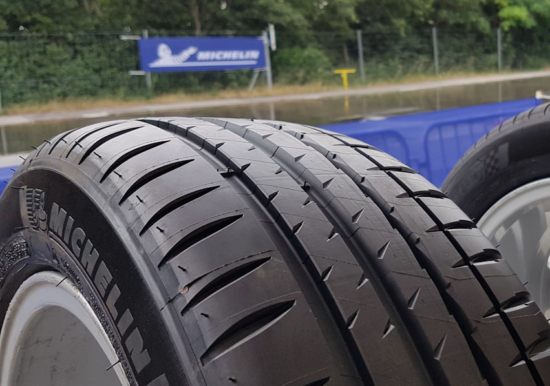Not competitive enough – Michelin confirms plant closures in Germany
 (Photo: Stephen Goodchild / Tyre Industry Publications Ltd)
(Photo: Stephen Goodchild / Tyre Industry Publications Ltd)
Germany’s position as a centre of manufacturing took another blow today with the confirmation that Michelin will gradually cease production at its Karlsruhe and Trier sites, as well as the manufacture of new tyres and semi-finished products in Homburg. Michelin will also transfer its Customer Contact Center Center for Austria, Germany and Switzerland from Karlsruhe to Poland. These changes are expected to be completed by the end of 2025 and will impact a total of 1,532 employees.
Michelin states that in addition to growing competition from budget truck tyres, its decision is linked to “the lack of competitiveness of our German operations” for European and export markets. The company will record a provision of approximately 425 million euros in its consolidated financial results for the year 2023.
“This unavoidable decision was very difficult for us,” says Maria Röttger, president and chief executive officer of Michelin’s Northern Europe region. “The commitment of our employees, the progress made within the company and the investments made in recent years in the activities concerned can no longer compensate for the strong competitive pressure. Our priority now is to support our employees as best we can and to accompany them individually into a new future.”
Truck tyre retreading in Homburg, Michelin’s largest plant of this type in Europe, is not affected by these changes; nor is RFID chip processing at the site or production at the company’s car tyre plant in Bad Kreuznach. Michelin states that these facilities will not only remain open, but it will also modernise both to make them “even more cost-efficient and environmentally friendly for the future.”
Direct & unfavourable impact
When Michelin speaks of growing competition from budget truck tyres, it is referring to the eleven-percentage point gain in market share these products achieved in Europe between 2013 and 2022, growth occurring at the expense of the premium and mid-price brands. The competitiveness of Michelin’s truck tyres and of Germany as an industrial location has been further harmed by decisions made in response to the Covid-19 pandemic and recent geopolitical crises, as well as a high inflation rate. The company notes that in July 2023, industrial natural gas prices in Germany were more than twice as high as in 2015, while the price of electricity had risen by 51 per cent.
“These factors have a direct and unfavourable impact on industrial operations, including the export activities of the affected locations,” states Michelin. “They are no longer able to export competitively to other regions.
“Michelin is also pursuing a strategy of producing closer to the markets,” shares the company, as if seeking to further justify the announced closures. “This serves to improve customer service with a more robust, environmentally friendly and efficient logistics chain, resulting in a decline in exports.” It adds that this export strategy, as well as the market shift towards lower-priced budget truck tyres and the disadvantageous framework conditions for Germany’s competitiveness, are leading to structural overcapacity and an underutilisation of the affected production sites.
As for the customer contact centre in Karlsruhe, Michelin says increased competitive and price pressure has created the need for “more efficient structural change.” To “ensure overall competitiveness,” the company will relocate this centre to Poland by the end of 2025.
Workforce to shrink almost 25%
After the announced closures take place, Michelin will be present in Germany with around 2,780 production, logistics, sales, marketing and administration employees. Approximately 2,000 further Michelin Group employees work in local subsidiaries, such as Euromaster and Ihle, which means the company’s total workforce will shrink almost a quarter through the closures.
Smart strategies needed
Fighting talk today from trade union IGBCE, with Matthias Hille, regional leader and member of the Michelin Deutschland Supervisory Board, stating that IGBCE will “not simply accept the job cuts and plant closures.” He views the measures as “wrong” and accuses Michelin of only wanting to “maximise profits.” He sees a need for “smart strategies” instead of plant closures as a “knee-jerk” reaction. “We are not giving up on the sites and will continue to work on alternative concepts.”
Michelin is not the only tyre manufacturer currently planning to close facilities in Germany. Goodyear also intends to completely close its factory in Fulda as early as 2025, with around 1,050 job losses, and largely wind down its Fürstenwalde site, with some 700 of 1,000 jobs there going by 2027, including all tyre production. Continental announced the closure of its tyre plant in Aachen in 2020, and today only a few hundred of the former 1,800-strong workforce are still employed at the site. They will wind up operations there by the end of 2023.
A clear commitment expected
Germany is currently home to 12 tyre production facilities. IGBCE points out that through Goodyear and Michelin’s plans, a third of these may disappear – along with thousands of jobs. But although acknowledging the influence of energy prices, growing competitive pressures and market overcapacity upon the tyre makers’ respective decisions, the union seems reluctant to criticise the policymakers whose decisions have exacerbated or even caused this perfect storm. Instead, IGBCE board member Francesco Grioli dismisses these as not valid arguments.
Grioli states an expectation that “these long-established companies” show a “clear commitment to the German sites even in difficult economic times and more dedication to the employees, many of whom are the second or third generation to work in the tyre plants.” He concludes that the union will “fight for every single job.”


 Bridgestone
Bridgestone

Comments